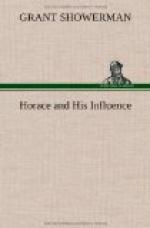The decline of humane studies in the thirteenth and fourteenth centuries meant also the decline of interest in Horace, who had always been above all the poet of the cultivated few. At the beginning of the thirteenth century in Italy, nowhere but at Bologna and Rome was Latin taught except as the elementary instruction necessary to the study of civil and canonical law. Gaufried of Vinesaux, coming from England to Italy, and composing an Ars Dictaminis and a Poietria Nova containing Horatian reminiscences, is one of two or three significant examples of Latin teachers who concerned themselves with literature as well as language. Coluccio Salutati, wanting to buy a copy of Horace in 1370, is apparently unable to find it. The decline of interest in Horace will be arrested only by the Rebirth of Learning.
The intellectual movement back to the classical authors and the classical civilizations is well called the Rebirth. The brilliance of the new era as compared with the thousand years that lead to it from the most high and palmiest days of Rome is such as to dim almost to darkness the brightest days of medieval culture. The new life into which Horace is now to enter will be so spirited and full that the old life, though by no means devoid of active influence in society at large and in the individual soul, will seem indeed like a long death and a waiting for the resurrection into a new heaven and a new earth.
4. HORACE AND MODERN TIMES
THE REBIRTH OF HORACE
The national character of the Aeneid gave Virgil a greater appeal than Horace in ancient Roman times. In the Middle Age, his qualities as story-teller and poet of the compassionate heart, together with his fame as necromancer and prophet, made still more pronounced the favor in which he was held. The ignorance of the earlier centuries of the period could not appreciate Horace the logical, the intellectual, the difficult, while the schematized religion and knowledge of the later were not attracted by Horace the philosophical and individual.
With the Renaissance and its quickening of intellectual life in general, and in particular the value it set upon personality and individualism, the positions of the poets were reversed. For four hundred years now it can hardly be denied that Horace rather than Virgil has been the representative Latin poet of humanism.
This is not to say that Horace is greater than Virgil, or that he is as great. Virgil is still the poet of stately movement and golden narrative, the poet of the grand style. Owing to the greater facility with which he may be read, he is also still the poet of the young and of greater numbers. With the coming of the new era he did not lose in the esteem that is based upon the appreciation of literary art, but rather gained.




